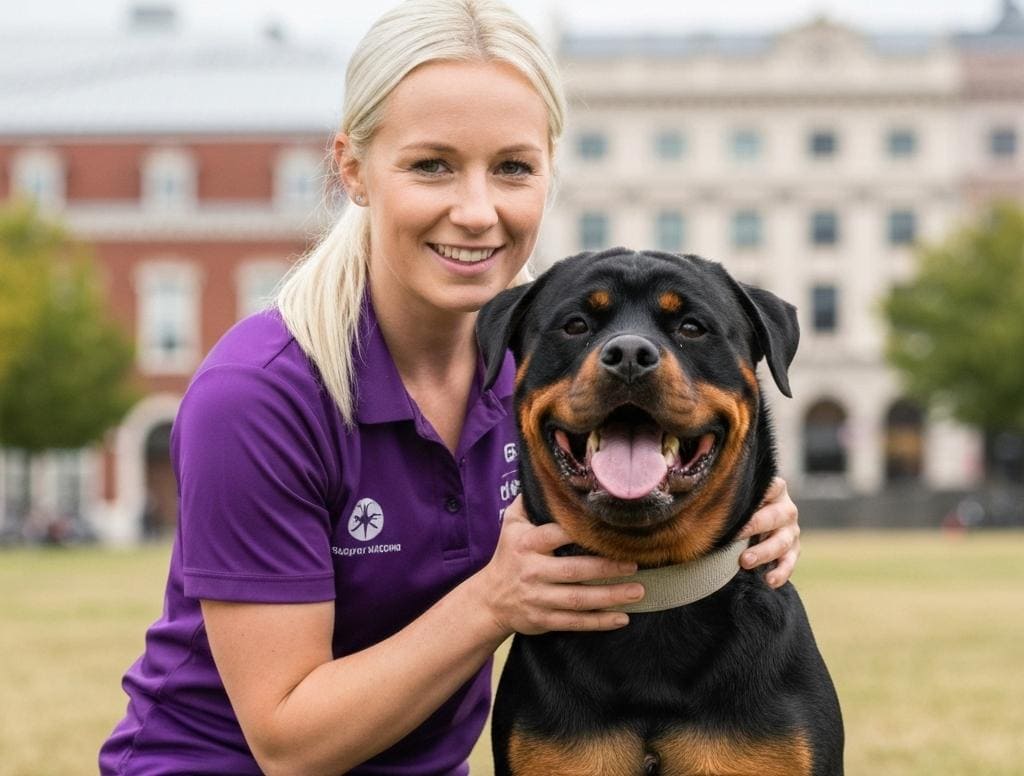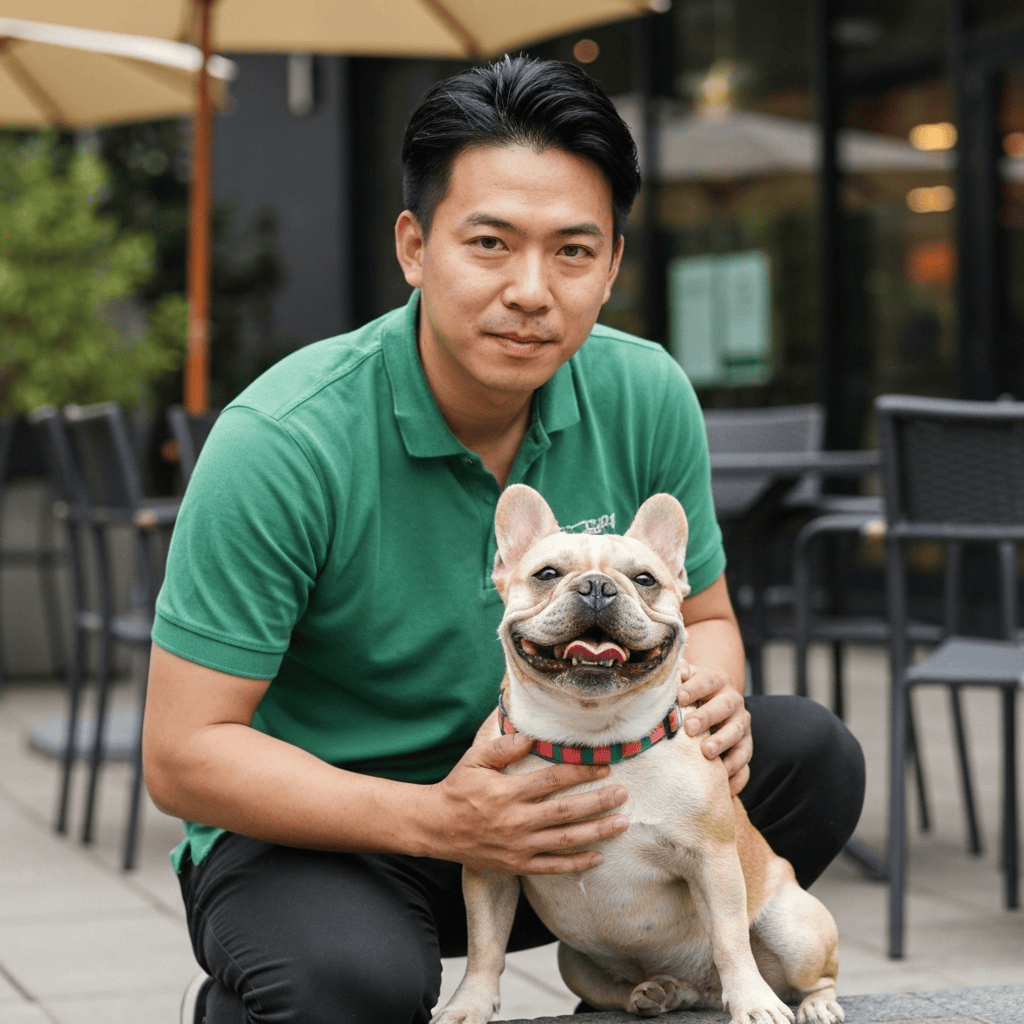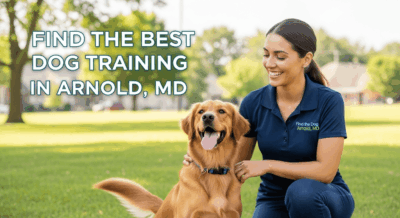Your Complete Guide to Choosing a Dog Trainer in Arnold
Living in Arnold means walks along the B&A Trail, quick trips to Quiet Waters, and busy sidewalks on College Parkway. Your dog needs skills that fit real life on the Broadneck Peninsula, whether that’s staying calm when cyclists zoom past or greeting neighbors politely at Broadneck Park.
This guide focuses on dog owners in Arnold and nearby neighborhoods, with clear local rules, places to train, and what to expect from training programs in Anne Arundel County, Maryland. We’ll help you find the right trainer and understand what good training looks like in our area.
How to Choose the Right Trainer
The best trainers use positive reinforcement methods and create plans that fit your specific goals. This approach works especially well when you’re teaching your dog to walk nicely on the B&A Trail or stay calm during busy moments at local parks.
When you’re interviewing trainers, ask about their education and how they stay current with modern techniques. Many respected trainers hold credentials like dog trainer certifications, KPA-CTP, CPDT-KA, IAABC-CDBC, or CBCC-KA. These certifications show they’ve invested in learning proper techniques and staying updated on best practices.
Think about what training format makes sense for your household. In-home dog training works really well if you live in a townhouse and need help with door manners, yard boundaries, or getting your dog comfortable in your specific neighborhood. Group classes are great for dogs who need to practice focusing around other dogs and people. Private lessons give you the most personalized attention and work best for issues like reactivity or separation anxiety where your dog needs a quieter, less stimulating environment to learn.
If a trainer wants to meet in county parks for sessions, make sure they understand park rules. For formal classes held in public spaces, responsible trainers carry appropriate permits and insurance coverage.
Common Dog Training Methods Explained

The most effective training methods focus on teaching your dog what you want them to do, then building their ability to follow through even with Arnold’s everyday distractions like joggers, other dogs, and busy street activity.
Positive reinforcement training works by marking and rewarding the behaviors you want to see more of. Instead of focusing on what your dog does wrong, you’ll catch them doing things right and make those experiences rewarding. This might mean rewarding your dog for checking in with you during walks or staying calm when meeting new people.
For more serious issues, trainers use behavior modification techniques. If your dog struggles with fear, reactivity, or aggression, qualified professionals use methods like desensitization and counterconditioning to actually change how your dog feels about triggers, rather than just suppressing their reactions. This creates lasting change and helps your dog feel more comfortable in challenging situations.
Puppy training covers the basics every young dog needs: house training, bite inhibition, and early socialization experiences. Good puppy programs also help your dog get used to the things they’ll encounter around Arnold, like strollers on sidewalks, cyclists on trails, and children playing at parks.
Life skills training focuses on the everyday behaviors that make living with your dog easier and more enjoyable. This includes loose-leash walking for busy sidewalks, reliable recall for fenced dog parks, and learning to settle calmly when you want to sit at a restaurant patio or visit outdoor events.
Smart trainers also teach you about management – using tools like gates, crates, and good routines to prevent your dog from practicing problem behaviors while you’re working on training solutions.
Stay away from any trainer who relies on intimidation, fear, or causing pain to get results. Humane, science-based methods create lasting changes and help you build a trusting relationship with a well-behaved dog.
Average Cost of Dog Training in Arnold (Updated for 2025)
Training prices in Arnold and throughout Anne Arundel County depend on the trainer’s experience, how long sessions last, and what type of program you choose. Here’s what most local families can expect to pay.
| Service Type | Typical Price Range | What to Expect |
|---|---|---|
| Group classes (4–6 weeks) | $160 – $300 | Basic obedience, puppy classes, or specialty topics in small groups |
| Private lessons (60–75 min) | $110 – $185 per session | Custom coaching at home or a local park with homework plans |
| Puppy packages (4–6 visits) | $420 – $750 total | House training, socialization, nipping, crate routines |
| Day training (trainer works your dog) | $500 – $950 per week | Trainer handles reps, then teaches you; great for busy schedules |
| Board and train (2–4 weeks) | $2,200 – $4,800 total | Immersive program; insist on transparency and daily updates |
| Behavior consult (fear/reactivity) | $150 – $300 initial | Assessment, safety plan, and a targeted training program |
Because the Broadneck Peninsula is a desirable area with higher costs of living, training rates here tend to run a bit higher than some other parts of the Baltimore metro area. You’ll typically pay more for trainers with extensive experience or advanced certifications, but the investment often pays off in faster, more reliable results.
Questions to Ask a Potential Dog Trainer
Before you commit to working with any trainer, have a conversation to make sure they’re a good fit for you and your dog. Here are the important questions to cover:
- What training methods do you use, and how do you keep sessions upbeat and humane?
- Do you hold credentials like KPA-CTP or CPDT-KA, and how do you stay current?
- How will you tailor the training program to my goals and my dog’s history?
- Do you offer in-home dog training, group classes, or day training, and which fits my situation?
- How do you measure progress and adjust when we add distractions like other dogs or cyclists?
- What are total costs, travel fees, and cancellation terms?
- Do you carry liability insurance, and can you provide proof?
- For behavior cases, do you collaborate with veterinarians if needed?
- What practice should I do between training sessions?
A good trainer will answer these questions clearly and help you understand what to expect throughout the training process.
Local Arnold Resources for Dog Owners
Arnold and the surrounding area offer several great spots for training practice and socializing your dog. Here’s what’s available locally.
Broadneck Park Dog Park in Arnold gives you fenced off-leash areas for both small and large dogs. It’s a good place to practice recall and work on your dog’s social skills once they have basic training down. Check posted rules and county permits at Anne Arundel County Broadneck Park.
Quiet Waters Park Dog Park and Dog Beach in nearby Annapolis offers more space and water access for dogs who are ready for that level of freedom and distraction. It’s an excellent place for advanced recall practice and socialization when your dog has solid basic skills. See park details at Quiet Waters Park.
Downs Park Dog Beach in Pasadena provides an off-leash swimming area with clear rules for dogs and owners. Visit Downs Park for current information.
The B&A Trail Park gives you an ideal place to practice leash manners around real-world distractions like bikes, runners, and strollers. Start in the quieter sections near Arnold and gradually work up to busier areas as your dog improves. Find more information at Baltimore & Annapolis Trail Park.
For administrative needs, Anne Arundel County Animal Care & Control handles licensing, lost pet reports, and local animal laws. See Animal Care & Control for services and requirements.
Maryland’s rabies vaccination requirements and bite incident protocols are managed at the state level through Maryland Department of Health.
Local Rules That Affect Training
Anne Arundel County sets the animal control rules for Arnold, and understanding these helps you plan safe, legal training sessions with your dog.
The county has a leash rule that requires dogs to be leashed in all public spaces unless you’re inside designated off-leash dog parks. This means your dog needs to be on leash when walking neighborhoods, using the B&A Trail, or visiting most county parks.
Dog licensing is required for all dogs over four months old, along with current rabies vaccination. Keep your license tag on your dog and carry vaccination records when visiting parks, as staff sometimes check compliance.
Barking and nuisance complaints can lead to enforcement action if your dog’s behavior consistently disturbs neighbors. Good training and proper mental enrichment help prevent these issues from developing.
When it comes to parks and training classes, casual practice sessions are welcome as long as you follow posted park rules. But organized group classes held in county parks may require permits and proof of insurance from the instructor.
For the most current rules, forms, or specific questions, contact Anne Arundel County Animal Care & Control directly.
Trainer Business Requirements in Maryland
Maryland doesn’t require dog trainers to hold special state licenses – most operate under standard business registrations. However, responsible trainers do carry general liability insurance to protect themselves and their clients.
If a trainer offers boarding, runs board-and-train programs, or conducts classes in public facilities, they may need additional permits or insurance coverage depending on the venue’s requirements and county rules.

Common Questions
How much does in-home dog training cost?
In Arnold, expect to pay $110 to $185 per private session, with most trainers offering package discounts if you book multiple sessions upfront. Complex behavior cases may cost more initially because they require detailed assessment and custom planning.
Is in-home dog training worth it?
Yes, especially for issues like door manners, house training, and reactivity that happen in your specific environment. You’ll work on problems exactly where they occur, and your trainer can give you personalized coaching that fits your home layout, neighborhood, and daily routines.
Can you pay someone to house train your dog?
Absolutely. Day training programs and puppy packages are designed for busy families who want professional help with house training. Many trainers will handle the repetitive training work during the day, then teach you how to maintain progress during evenings and weekends.
What is the 3-3-3 rule for dog training?
This guideline helps set realistic expectations for newly adopted dogs or dogs adjusting to major changes. Plan for about 3 days for your dog to decompress from stress, 3 weeks to learn your household routines, and 3 months to fully settle into their new life. Good training plans respect this timeline rather than rushing the process.
How long will it take to reach my training goals?
Most dogs start showing noticeable progress within 2 to 3 weeks if you practice consistently every day. Basic obedience skills like sit, stay, and loose-leash walking typically take 4 to 8 weeks to become reliable. More complex issues like reactivity or separation anxiety often require several months of careful behavior modification work.
What should I bring to group classes?
Pack a flat collar or well-fitted harness, a standard 6-foot leash, high-value treats your dog loves, poop bags, water, and proof of vaccinations if the facility requests it. Leave retractable leashes at home since they can be dangerous in group settings.
What’s the leash law in Arnold?
Arnold follows Anne Arundel County regulations requiring dogs to be leashed in all public areas except designated off-leash dog parks. This includes neighborhoods, trails, regular parks, and shopping areas.
Do I need a dog license in Arnold or Anne Arundel County?
Yes, all dogs four months and older must have a current county license and rabies vaccination. Keep the license tag on your dog’s collar and bring vaccination records when visiting county parks or facilities.
What shots does my dog need in Anne Arundel County or Maryland?
Maryland law requires current rabies vaccination for all dogs. Your veterinarian will likely recommend additional core vaccines like distemper, parvovirus, and adenovirus based on your dog’s age, health, and lifestyle risks.
Are dog trainers required to be licensed in Arnold or Anne Arundel County or Maryland?
There’s no special dog trainer license required by the state or county. Trainers operate under general business regulations, though facilities that board dogs or conduct organized classes may need specific permits and insurance coverage.
Where can I practice off-leash recall?
Use secure, fenced areas like Broadneck Park Dog Park, Quiet Waters Dog Park, or the designated dog beach at Downs Park. Start during less busy times when there are fewer distractions, and keep training sessions short and positive.
Which dog parks allow training around Arnold?
Broadneck Park Dog Park in Arnold, Quiet Waters Dog Park in Annapolis, and Downs Park Dog Beach in Pasadena all welcome casual training practice as long as you follow posted rules and your dog plays well with others. Organized training classes may require county permits.
What beaches and trails allow dogs for training?
The B&A Trail welcomes leashed dogs and provides excellent real-world training opportunities. For water access, try Downs Park Dog Beach and the dog beach section at Quiet Waters Park. Sandy Point State Park allows pets seasonally in certain areas, but check current pet policies at Sandy Point State Park before visiting.
Getting Started With Training
The key to successful dog training in Arnold starts with choosing humane methods and finding a trainer who takes time to explain their approach clearly. Look for someone who understands the specific challenges of living in our area, from busy sidewalks to crowded parks to the distractions of waterfront activities.
Once you start training, practice in short, frequent sessions around Arnold’s real-world distractions rather than just in your living room. Your dog needs to learn how to listen and respond when there are joggers, cyclists, other dogs, and all the interesting sights and smells of daily life on the Broadneck Peninsula.
Stay current with county licensing requirements, rabies vaccinations, and park rules to avoid fines or problems when you’re out practicing with your dog. Most trainers can help you understand these requirements if you’re unsure about anything.
If you’re not sure where to start, ask potential trainers about a consultation or evaluation session. Many offer these at reduced rates or even free, which gives you a chance to see their approach and determine if they’re a good fit before committing to a full program.
When professional credentials are important to you, ask trainers to explain which programs they’ve completed and what those certifications mean. You can learn more about credentials like KPA-CTP, CPDT-KA, and IAABC-CDBC through the links provided earlier in this guide. With the right trainer and consistent practice, dog training in Arnold becomes an enjoyable experience that strengthens the bond between you and your dog while making daily life much easier.
